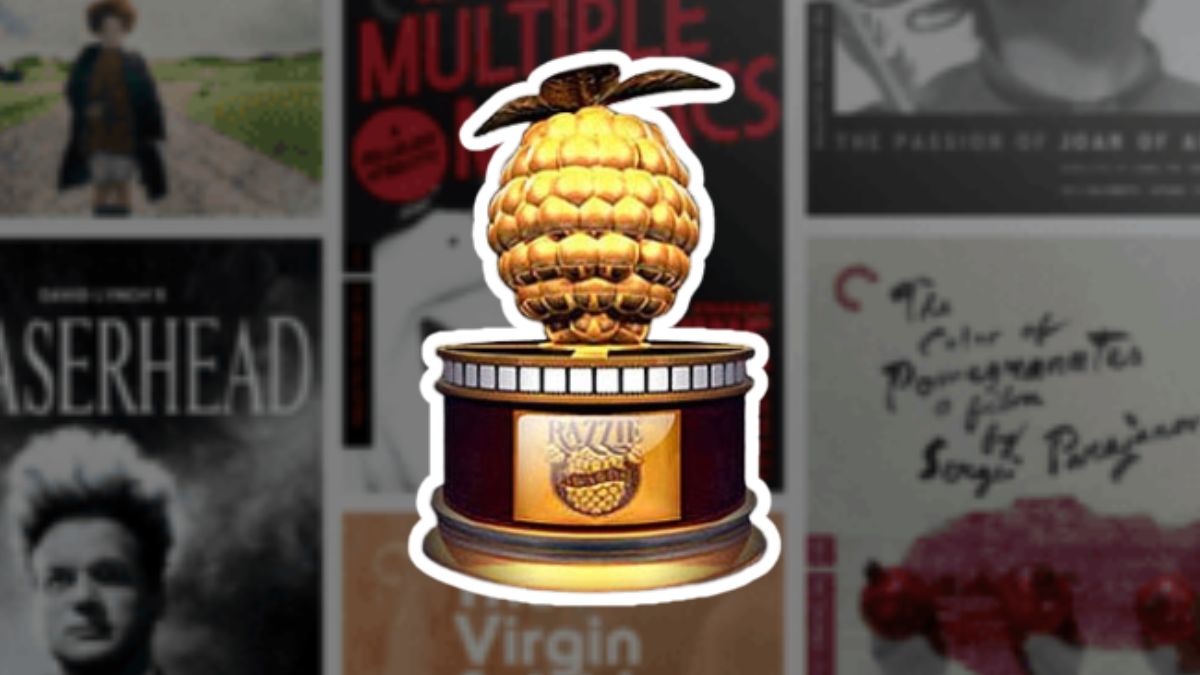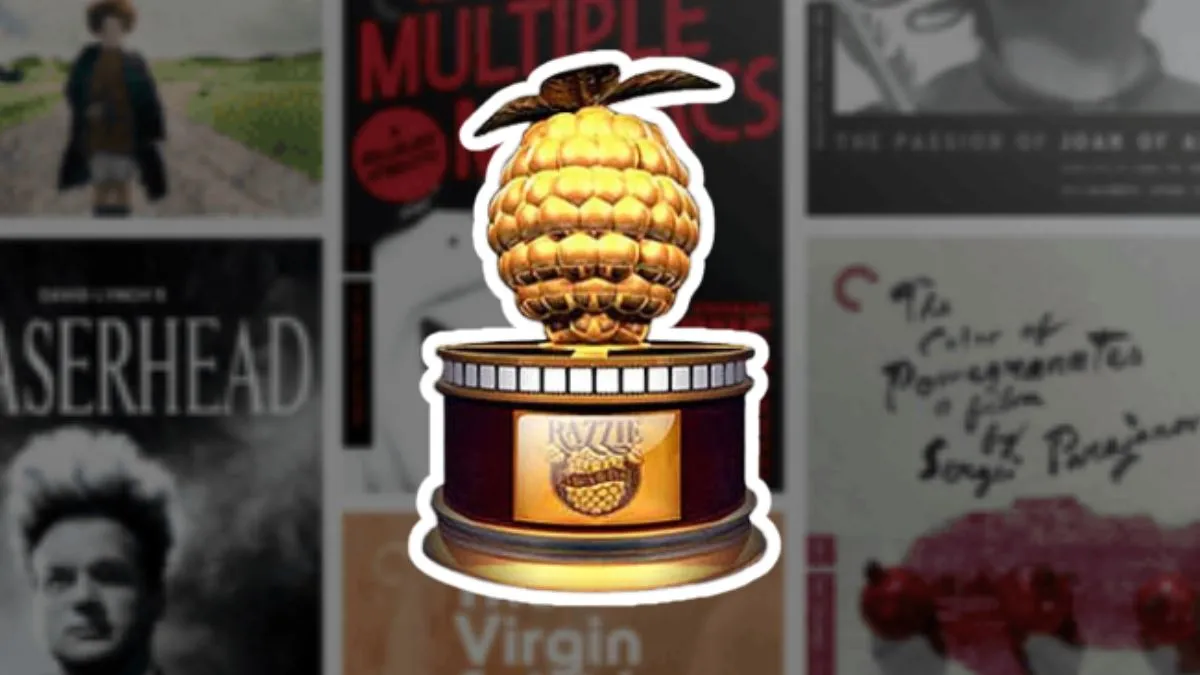Perhaps my opinion’s warped by an unabashed admiration of bad movies, but I was thrilled to see that Criterion would be adding a Razzies collection. However, the juxtaposition of Criterion’s highfalutin reputation and The Golden Raspberries Awards’ lowbrow one had me reflecting on the nature of the Oscars’ parody.
The History (& Merits) of The Golden Raspberry Awards

Before delving into the overdue expiration date on the Razzies, I find it only fair to give them their flowers. The parody award show honoring the worst in film had humble and homegrown origins. Motivated by the double feature viewing experience of Xanadu and Can’t Stop the Music, publicist John B. Wilson gathered friends in 1981 to roast the worst cinematic entries the year had to offer. Trash-talking with friends is truly one of life’s simple joys, so it’s no surprise that Wilson’s party grew into an annual phenomenon and, eventually, a full-fledged institution of its own right.
From its grassroots origins to the premise of punching up at the Hollywood establishment, there’s something undoubtedly punk rock about the early days of The Golden Raspberry Awards. Off the heels of the historic WGA/SAG-AFTRA joint strike and amidst troubling trends in the streaming era – ranging from the dubious deployment of AI to tax write-offs like Coyote vs. Acme – the notion of criticizing the entertainment industry feels particularly fresh nowadays. However, the CEOs and production companies aren’t the ones who bear the brunt of the Razzies, and the award show fails to retain the luster of its novel roots.
The Razzies Have Attracted Their Fair Share of Criticism

In 2019, comedian Lauren Lapkus received a Razzie nomination for her performance in Netflix’s The Wrong Missy, which led to a rightful upheaval. Like the majority of her Razzie peers, Lapkus is an undoubtedly talented performer who happened to play a character in a critically panned film. However, unlike other Razzie nominees, Lapkus’ acting career was less established, so many decried this nomination as a misappropriation of the Razzies’ intent. Among one of her first major film roles, Lapkus herself discussed the sting of her Razzie nomination on the podcast Threedom.
Well before Lapkus, past Razzie nominees that have sparked debate about the very existence of the parody award show include child actors such as Macaulay Culkin and Star Wars‘ Jake Llyod. Many critics felt the line between comedy and cruelty was blurred with nominations like Culkin and Llyod, and even the award show itself has rescinded categories like the Worst Bruce Willis Performance in a 2021 Movie after becoming aware of Willis’ aphasia diagnosis. Another major criticism of the Razzies, as outlined by GQ‘s Scott Meslow, has come from its propensity to disproportionally target films that appeal to women and Black audiences.
Related: The Academy Probably Hates the Lack of Barbie Noms As Much as You
While I certainly encourage giving the Threedom episode “It Could Happen to You” a listen – if not to garner a degree of empathy for the position of a Razzie nominee, then just because the podcast is a sheer delight – I didn’t come here simply to label the Razzies as mean-spirited and then call it a day.
The Razzies Are a Victim of Their Own Constraints

While even the worst movies boast hard-working casts and crews that have truly cared and poured their entire souls into them, I don’t believe The Golden Raspberry Awards should be sunset solely because their nature can arouse hurt feelings in its nominees. In fact, some nominees and winners have even taken to the Razzies stage to own their moment in stride, perhaps none more iconically than Halle Berry after her Worst Actress win for Catwoman. Mean-spirited comedy, irreverence, and roasts often breed comedic brilliance, and I’d hate to see a world where there was no place for that brand of humor. However, the Razzies have proven an awkward fit for this style of comedy, and nominations such as Lapkus, Llyod, and even Willis caused indignation because they broke the award show’s established mold.
The problem with irreverence in comedy is that it can’t be selective, so The Razzies’ precedent of zeroing in on mainstream films and big stars each year made it more noticeable when they strayed from the course. If the Razzies had been nominating child stars, non-studio-backed films, and creators from an array of industry experience from the beginning, then it wouldn’t have drawn as much attention when they did so in later years. However, their nature was always intended to punch up, and while that’s certainly a worthy goal in its own right, it leads to an essentially pre-ordained list of nominees each year. (And this is further perpetuated by the fact that members of The Golden Raspberry Foundation are not required to watch any of the nominees.)
In the 2014 piece “Why I Hate the Razzies” Telegraph columnist Robbie Collin wrote: “The Razzies ongoing failure to train its sights on anything but the most obvious targets means it grows more tired and redundant by the year.” When The Golden Raspberry Awards first began in the ’80s, this premise was fresh and interesting, but by the time Collin penned his critique, it had grown decidedly old. And it’s been a decade since.
While, for some, the annual list of Razzie nominees may still elicit a short-lived Schadenfreude, the ceremony has proven that both straying from and being confined by its premise of punching up at the upper echelons of Hollywood is a lose-lose scenario. As with other comedy institutions, like Saturday Night Live, the annual award show suffers even further in a social media age, where a new release has already run through an entire meme cycle before the Razzies take a stab. For instance, hearing about Madame Web winning the Worst Picture Razzie next year at this time could never top the jokes permeating social media about the film this month.
The Criterion Channel’s Razzie Collection Emphasizes the Thin Line Between Bad & Brilliant

Whether you believe that the Razzies go too hard on creators or go too easy on them, the larger, looming question remains: what even is a bad movie? Much like Willis, The Razzies rescinded Shelley Duvall’s Worst Actress nomination for The Shining after light was shed on the treatment she suffered behind the scenes of the film. But why was any aspect of The Shining up for a Razzie in the first place? Mind you, Duvall and Stanley Kubrick both received nominations for The Shining at The Razzie’s inaugural ceremony, the one held in Wilson’s home. The Shining nominations make a convincing argument that the Razzie’s premise to send up the worst in film was flawed from the jump.
When The Criterion Channel announced their upcoming Razzies collection, many began discussing this exact topic on social media. Aside from The Shining, previous Razzie-nominated pictures like Scarface, The Blair Witch Project, and The Hunchback of Notre Dame were provided as evidence that the parody award show hardly ever achieves what it means to in the first place. This is a perennial debate among film lovers online, scrutinizing the veracity of the Razzies, box office “flops,” and low Rotten Tomato scores as a metric for the “poor” quality of a film. On the other hand, debate often circulates as to whether racking up major season awards/nominations, such as the Oscars or Golden Globes, serves as a viable indicator of a film’s quality. To add to the muddiness of these arbitrary standards, there have been years where films have been simultaneously nominated for both Golden Raspberry Awards and Oscars.
“While some infamous Razzie winners like Xanadu, Barb Wire, and Gigli live on as classics of camp and cult, others, like Michael Cimino’s Heaven’s Gate, Elaine May’s Ishtar, and Paul Verhoeven’s Showgirls have been reclaimed as fearlessly ambitious expressions of personal vision,” Criterion best summarized The Razzie dilemma. While I harbor no delusions that Freddy Got Fingered will make the leap from Criterion’s novelty streaming channel to the actual prestigious collection itself, I will always have a soft spot in my heart for Razzie winners.
The Golden Raspberry Awards were not a wasted concept, and their sometimes questionable track record continues to spark worthwhile discourse among Letterboxd users. But, for now, I’m content seeing the Razzies ride off into the sunset and embrace the show’s origins by roasting bad movies with friends in the comfort of my home.






Published: Mar 2, 2024 02:00 pm